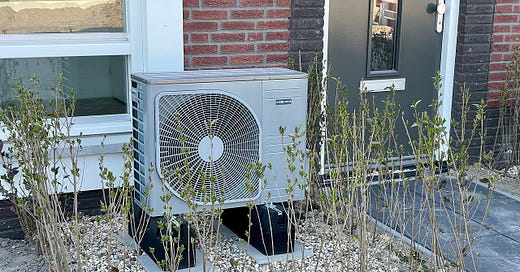
Discover more from Academy of Ideas
Why the boiler ban is a bad idea
Engineer Steve Jordan explains why a government-mandated switch to heat pumps is likely to be an expensive failure.
In recent weeks, some important elements of the UK government’s drive to ‘net zero’ emissions by 2050 have been called into question. The ban on new gas boilers by 2035 has attracted particular criticism, but less noticed has been a ban on oil-fired boilers by 2026. Since many rural homes aren’t connected to the gas network, they rely heavily on oil-fired boilers for central heating. Now it seems some Conservative MPs are in revolt at the plan.
The government is aiming to replace gas and oil boilers with electrically powered heat pumps. But are they a viable alternative? Here, engineer Steve Jordan explains how heat pumps work, why comparisons with gas boilers are often tendentious and why wider problems mean that a rush to use them is doomed to failure.
What is a heat pump?
Invented in 1856, heat pumps are very common, simple and reliable. Every air-conditioning unit, fridge and freezer has one. However, in these examples, heat is the waste by-product, not the target output.
An electric pump compresses a gas thus causing it to heat up. The warmer the gas before it is compressed, the more the heat produced by the pump. The process is the same as a hand pump used to inflate the tyre on your bicycle. As you pump, and so compress the air, the end of the pump body warms up.
Are heat pumps really more efficient than gas boilers?
It has become a very common ‘soundbite’ and you will have heard people quoting performance comparisons such as ‘heat pumps are four or five times as efficient as a boiler’. This is, in fact, very complicated and the mistake that is being made - a cynic would say deliberately so - is that the comparison is against an electric boiler and NOT a gas boiler. An electric boiler produces heat at a ratio of 1:1. In other words, one unit of electricity delivers one unit of heat.
That sounds good. What is the problem?
The characteristic of the process is the problem. To get efficiency of four or five to one, we need our the refrigerant gas in the heat pump to have absorbed a good amount of energy from the outside air. Typically, a heat pump can only absorb enough energy from the outside air to achieve these numbers on a summer’s day. In cold weather, when you need heating the most, the efficiency will be more in the range of one to 1.5 - one unit of electricity produces 1.5 units of heat.
That still sounds okay, doesn’t it?
The problem has many parts, the principal one being the running cost. A kilowatt-hour (kWh) of gas costs roughly 10p, but one kWh of electricity is about 30p. If you have a gas boiler, 1 kW of heat will cost you 10.7p with a modern condensing gas boiler. If you have a heat pump, then 1 kW of heat will cost you 20p.
But isn’t it right to say that the heat pump is much more efficient if I insulate my house and install double glazing?
No. It is excellent to do these things generally, but you now just require less energy for to heat your home. Your house is now more efficient, but how you heat it is irrelevant.
If lower cost isn’t possible, should we all have heat pumps because it is better for the environment to use electricity rather than burning gas?
Unfortunately, to make your electricity, we will need to burn the gas at the power station instead. Furthermore, unlike a modern boiler running at better than 90 per cent efficiency, the power station and grid transmission will only be about 55 per cent efficient and therefore it burns more gas overall.
But we can just add more wind and solar to the supply, can’t we?
While we do need to increase the supply from these technologies, they cannot deliver the extra 70GW to 100GW that would be required if we all switched to heat pumps. Even more difficult is the fickle nature of these technologies. When we have two or three weeks of cold winter weather with no wind and little sun, which is common, there will simply be no way of running heat pumps and supply would have to be prioritised. To compound matters further, we simply do not have the technology to store even one per cent of what would be required to bridge a period like this.
Are there any other problems?
There are a few other issues to consider if heat pumps are installed extensively.
1) Speed
Heat pumps operate at much lower temperatures than gas boilers and, therefore, cannot deliver heat on demand. The result is that you will need to heat your property for much of the time while you are away so that it is at the desired level when you return to your property. A gas boiler, however, can heat your property to a comfortable level very quickly so your heating can be turned off when there is nobody at home. There are too many variables to run a worthwhile calculation to compare, but the principle is straightforward.
2) Producing the electricity
We would need to generate a lot more base-load electricity. In fact, more than twice as much as today and this is not possible, even in the medium term.
3) Delivering the electricity
We would need to increase the capacity of the grid to deliver all the extra electricity. This would need to at least double. Again, that’s not possible any time soon.
4) Undermining gas
The gas grid would become unviable so we will also need to cook using electricity, thereby requiring more electricity and distribution.
5) What about the workers?
The target is for 600,000 heat pumps to be installed per year. That equates to 12,500 per week. Most installations will take a team of three to five people a week to complete. Today, there are only 4,000 installers in the UK.
6) It isn’t even ‘green’
The sustainability circle simply cannot be squared. The amount of raw material and energy required to produce everything, from all the oversized radiators and copper pipe to the actual heat pumps, let alone the supply-chain transport cost and so on, are simply enormous.
Heat-pump technology is important, and will continue to be so, but it is not the right technology to replace such a massive part of our energy mix. In fact, foisting heat pumps on millions of households is a disastrous idea that will only make our lives harder and poorer.
We’ll be scrutinising Net Zero policies at this year’s Battle of Ideas festival at Church House in London on the weekend of 28 & 29 October. For more information and early-bird tickets, visit the Battle of Ideas festival website.












Thank you for this Rob Lyons and Steve Jordon. That is a very helpful clear explanation of what heat pumps can and cannot do. Pushing them clearly makes no sense, so we then have to ask why the obsession with them?
Spot on about madness of this Net Zero idea. Unless wearing a hair shirt (or, more likely, having others wear one for them) is their thing, then only someone who hasn’t a clue what this means in practice would advocate it. It’s not just points around infrastructure, efficiency and the practicality of the idea (which have well made in this article), it’s about aspirations.
I grew up in an all electric house in the 1970’s. It was always freezing cold in winter and we lived in the relatively mild climate of the coastal plain in south east Wales.
There was ice on the inside of the windows when we woke up so we used to leave our clothes within reach at night so in the morning we could grab them and get dressed in bed before summoning the courage to leave the warmth of the blankets.
The new fangled storage heaters, which had been charging up overnight on Economy 7, just about started to give off some heat as we left for school and they continued to heat an empty house for the rest of the day. By the time we got home from school, the stored heat was exhausted and the house began to cool down again so we huddled around a fan heater in the living room to keep warm while watching Mike Yarwood, Benny Hill or Dave Allen on TV.
The contrast between that and comfort and convenience of a house with gas-fired central heating is, like, well, the twenty first century and the 19 fucking 70’s!
Slow heat? No thanks! Low heat? No thanks! Been there, done that. It wasn’t anything to aspire to, then, certainly nothing to aspire to now!